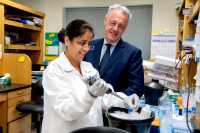Antibiotic Resistance, Author Interviews, Cancer Research, Genetic Research, Journal Clinical Oncology, University Texas / 03.10.2019
Most BRCA Testing Done in Women Already Diagnosed With Breast Cancer
MedicalResearch.com Interview with:
Fangjian Guo, MD, PhD
Department of Obstetrics and Gynecology
Center for Interdisciplinary Research in Women’s Health
University of Texas Medical Branch
Galveston TX
MedicalResearch.com: What is the background for this study? What are the main findings?
Response: The identification of BRCA1/BRCA2 pathogenic variants in women susceptible to breast or ovarian cancer in the 1990s created an opportunity for targeted, individualized cancer prevention. BRCA testing in young women before cancer onset enables early detection of those with increased cancer risk and creates an opportunity to offer life-saving prophylactic procedures and medication.
We used insurance claims data to assess the use of BRCA testing in unaffected young women <40 years of age between 2006 and 2017 and found that BRCA testing among cancer-free women under 40 has more than doubled in recent years. However, only about 25% of all BRCA testing done in 2017 was performed in unaffected young women under 40. (more…)































